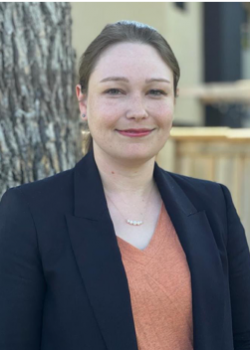Business Law Clinic Students Support APTN’s Application to CRTC for Increased Indigenous Language Programming
On July 26, law students from the Faculty of Law’s L. Kerry Vickar Business Law Clinic submitted a six-page letter supporting the Aboriginal Peoples Television Network’s (APTN) application to the Canadian Radio-television and Telecommunications Commission (CRTC) to increase Indigenous Language Programming by approximately 163% and consolidate their current four channels into two (one in English/French and the other for Indigenous language programming).
APTN’s Licence Amendment Application is a Part 1 CRTC Proceeding that was initiated by APTN on June 22, 2023. According to the CRTC’s Rules of Procedure, in this type of proceeding, the public is given 30 days to submit comments, letters of support or interventions relating to the application. The CRTC called for public submissions by July 31, 2023. APTN then has 10 days (until August 10) to reply to any interventions. The CRTC then examines all the written submissions and issues a decision.
As of the date of this article, there have been an overwhelming number of comments and letters supporting APTN’s application.
The Business Law Clinic students feel strongly that preserving Indigenous language deserves everyone’s support. Students at the Clinic work to help others find practical solutions to their real-world problems. The opportunity to support APTN’s plan to increase Indigenous language programming by submitting a letter of support was something that they felt they needed to do.
Language is invaluable. Among other things, it is critical in shaping identity and preserving culture. Further, Indigenous language is an essential component of our nation’s cultural heritage. Many Indigenous languages are facing extinction and loss due to historical injustices and modern-day challenges. APTN’s goal is to combat some of these challenges. The Business Law Clinic students agree and decided to say so.

Emily Palmer, 2L
Emily Palmer (2L) shared the importance of this initiative. “Support of APTN’s expansion of Indigenous language programming is integral and an important step towards Reconciliation for our country,” she said.
“To protect, preserve, and revitalize Indigenous languages serves to amplify and empower the many voices in Indigenous communities and to avoid the risk of such languages becoming extinct.”
Lisa Haydey (2L) noted the importance in supporting this initiative, “APTN’s Application marks a critical opportunity to support other languages and cultures. Everyone deserves to have programming in their own languages to tell their own stories,” says Lisa.
“We are privileged to utilize our platform to bring attention to such an important issue and to use our voices to support the voices of others.”
Working at the L. Kerry Vickar Business Law Clinic has been invaluable to students such as Emily and Lisa in allowing them to participate in practical experiences including advocating for APTN, supporting Indigenous languages, learning how to submit comments to a regulator, the complex nature of Canadian broadcasting, the importance of change, the power of story, and the responsibilities that everyone has in taking steps towards Reconciliation.

Lisa Haydey, 2L
Upon reviewing APTN’s application, the law students found it to be a reasonable and powerfully worded document. They concluded it would be unconscionable to deny or limit Indigenous peoples their right to tell important Indigenous stories in their own languages.
Over 300 comments were submitted to the CRTC, including a letter of support by the National Screen Institute (NSI) which is also headquartered in Winnipeg. As seen on their website and evidenced through action, NSI is a leader in supporting creators across Canada, including Indigenous creators and is vocal about the importance of “Supporting storytellers to create a better world” and is confident that “Everyone’s story has the power to inspire change.”
Through their experiences at the Clinic, the law students are learning that creatives are often undervalued and under-appreciated; but deserving of support for their service in igniting joy from misery, drawing out meaning from nothing and much more. Supporting Indigenous creatives is economic reconciliation in action. Generally, supporting creatives contributes to a more equitable and empathetic society.

Kassandra Taverner, 2L
Coming soon to the Faculty of Law is a new and innovative Manitoba Legal Clinic for the Arts which will be operated by law students in the clinical externship program to provide pro-bono legal information and services tailored specifically for Manitoba artists, creatives, arts and cultural organizations that do not have a lawyer and cannot afford legal services.
For more information about APTN and its latest productions, please visit its website.
The APTN application may be downloaded from its website.
The Business Law Clinic students’ letter to the CRTC in support of the APTN application may be read online.






